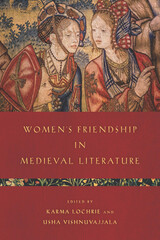2 books about Female friendship in literature

A Desire for Women
Relational Psychoanalysis, Writing, and Relationships between Women
Juhasz, Suzanne
Rutgers University Press, 2003
This book explores women's desire for women as it is located in examples of twentieth-century British and American women's writing, including fiction, memoir, and poetry by such writers as Virginia Woolf, Vivian Gornick, Dorothy Allison, Mary Gordon, Toni Morrison, Marilyn Hacker, and Audre Lorde. Suzanne Juhasz discusses how literary writing functions to enact and negotiate a series of relationships between women: daughter-mother, mother-daughter, lesbian lover-lesbian lover, writer-reader, and reader-writer. She shows how writing is a component of interpersonal relationships and how relationships are central to the construction of personal and social identity.
Uniquely weaving together psychoanalytic, feminist, queer, and literary theory as well as memoir to examine the value and meaning of relationships between women, Juhasz explores the writings of adult daughters, mothers, and lovers to consider how language both traces and shapes the contours of experience. She emphasizes the initial bond between mother and infant as the bedrock of identity formation, a process involving love, recognition, desire, and language, and shows how that relationship serves as source and model for all future loves.
Juhasz's lucid prose unravels the meaningful yet overlooked intricacies of the relationships that inflect much of women's writing in the twentieth century.
Uniquely weaving together psychoanalytic, feminist, queer, and literary theory as well as memoir to examine the value and meaning of relationships between women, Juhasz explores the writings of adult daughters, mothers, and lovers to consider how language both traces and shapes the contours of experience. She emphasizes the initial bond between mother and infant as the bedrock of identity formation, a process involving love, recognition, desire, and language, and shows how that relationship serves as source and model for all future loves.
Juhasz's lucid prose unravels the meaningful yet overlooked intricacies of the relationships that inflect much of women's writing in the twentieth century.
[more]

Women’s Friendship in Medieval Literature
Edited by Karma Lochrie and Usha Vishnuvajjala
The Ohio State University Press, 2022
In Women’s Friendship in Medieval Literature, Karma Lochrie and Usha Vishnuvajjala bring together established scholars and new voices to illuminate a previously understudied but consequential element of life in the Middle Ages. Contributors focus on representations of women’s friendships in medieval European literature and their afterlives both to historicize them and draw out the finer nuances of the multitude of forms, affects, values, and ethics that emerge within those friendships. This volume examines works by Chaucer, Gower, Malory, Marie de France, female saints, and late-Middle Scots poets alongside lesser-known late medieval lyrics and Middle English romances to chart women’s friendships and their many and sometimes conflicting affinities with the cultural categories of gender, religion, politics, and sexuality. In addition to exploring the parameters of female friendship across a range of texts and historical contexts, contributors evaluate the political, religious, and civic structures negotiated in public and private and engage with the long history of theory and philosophy on friendship. The result is a theoretical and historical rubric for the future study of women’s friendships in medieval texts and beyond.
Contributors:
Penelope Anderson, Andrea Boffa, Jennifer N. Brown, Christine Chism, Melissa Ridley Elmes, Laurie Finke, Carissa M. Harris, Lydia Yaitsky Kertz, Clare A. Lees, Karma Lochrie, Gillian R. Overing, Alexandra Verini, Usha Vishnuvajjala, Stella Wang
[more]
READERS
Browse our collection.
PUBLISHERS
See BiblioVault's publisher services.
STUDENT SERVICES
Files for college accessibility offices.
UChicago Accessibility Resources
home | accessibility | search | about | contact us
BiblioVault ® 2001 - 2024
The University of Chicago Press









